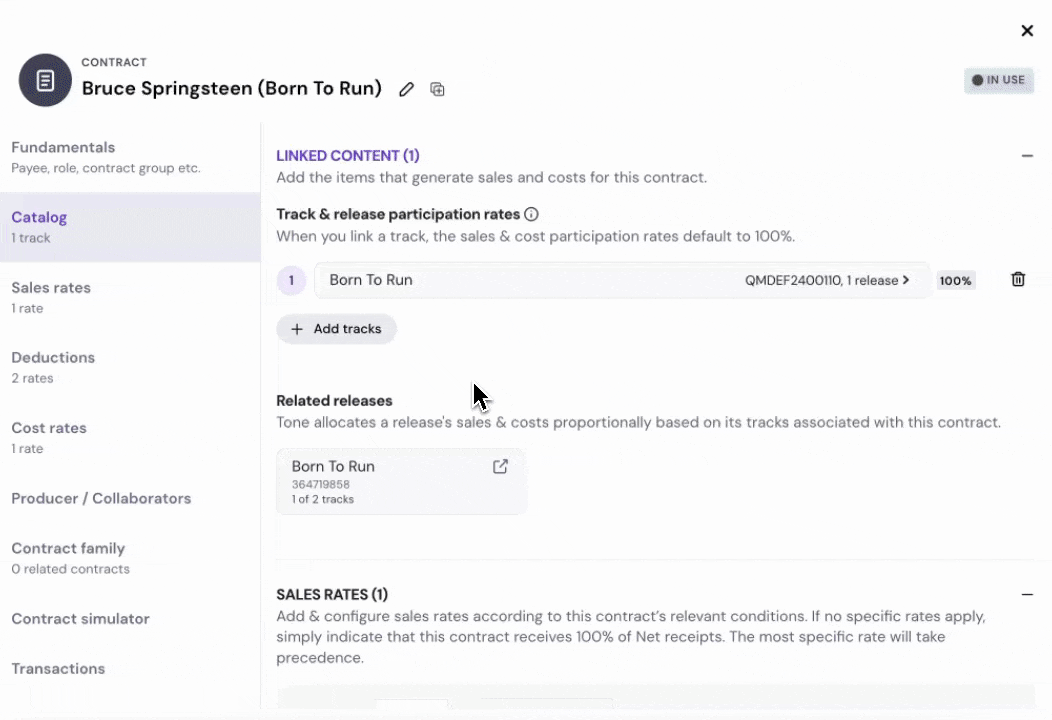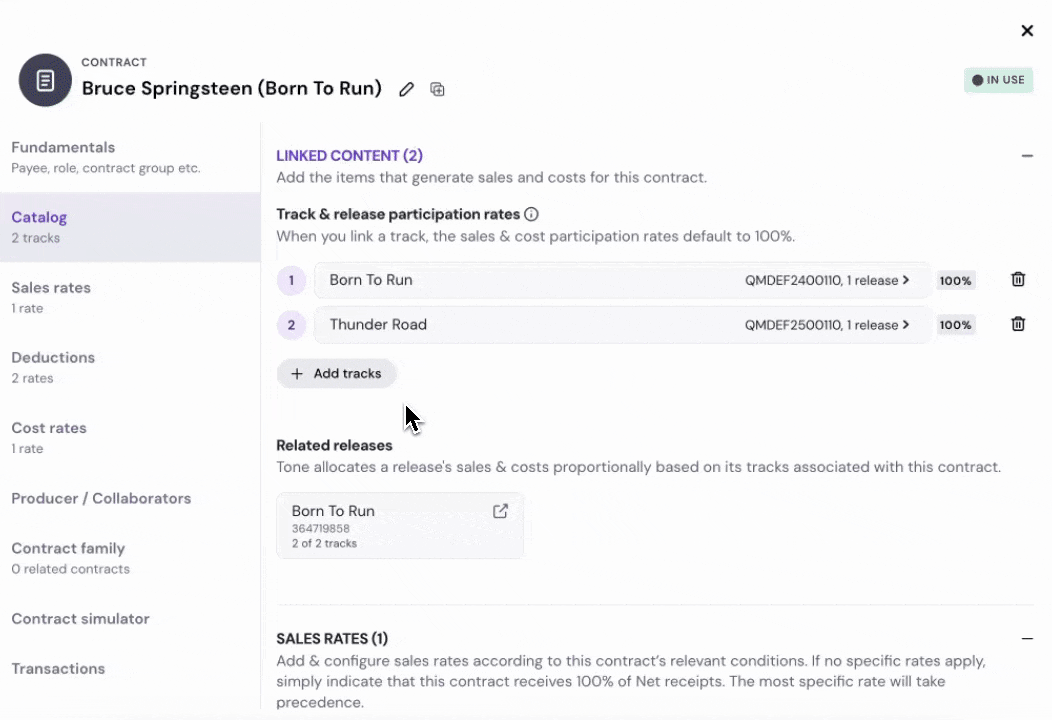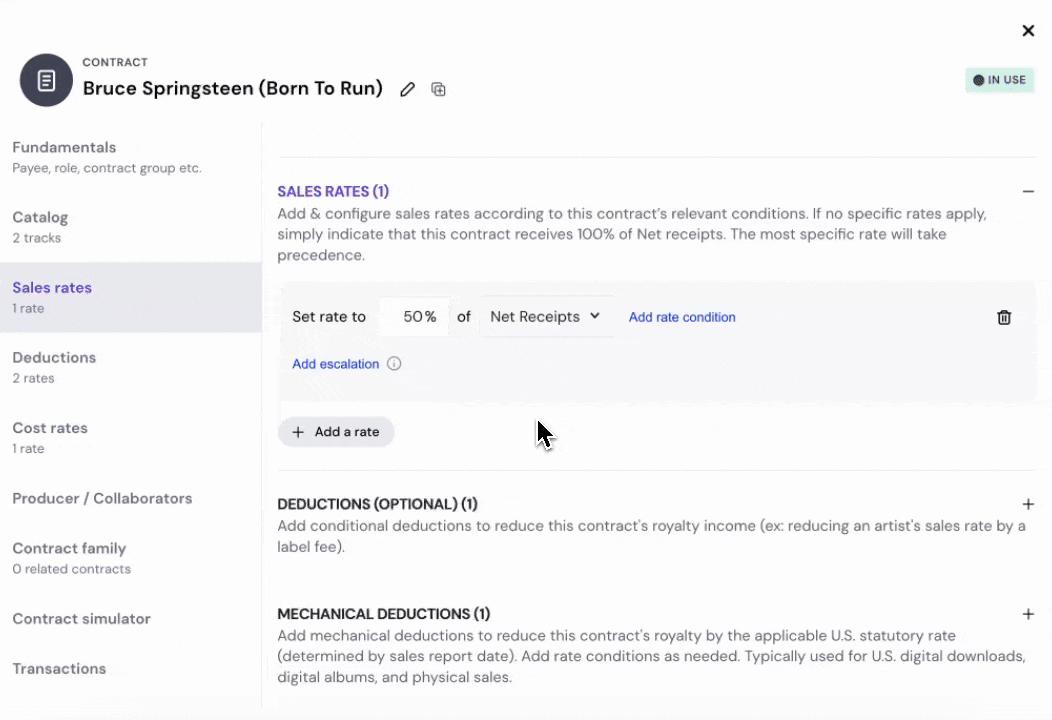When it comes to music royalties payouts, most people only look at the final number on a statement. But music royalty professionals know that each payout is the result of unique deal parameters, countless data sources and collaboration splits, which create nuanced contract terms behind every statement. At Tone, we know the intricacies that go into creating even the “simplest” music deal. That’s why we built a music royalty platform that makes it easy to model these common but complicated scenarios, letting your whole team see exactly how money flows to the royalty statement. Two of the most powerful tools Tone offers for reflecting these real-world complexities are participation rates and escalations.
In this deep dive, we’ll break down:
- How Participation Rates shape royalties
- How Escalations handle evolving deal terms when sales benchmarks are met
- How you can test every detail in Tone’s Contract Simulator before a royalty period runs
If you’re a label, publisher, or royalty expert who’s ever asked “Wait, how did we get this number?” — our music royalty platform is here to help you navigate the backend of complex music royalty deals.
Understanding Participation Rates in Tone
When you add a track to a contract in Tone, the platform assumes the contract shares 100% of the sales and costs by default. But in the real world, deals are rarely that clean.
Participation rates let you define exactly how much of a track’s or release’s sales and costs a contract shares in—before applying any royalty splits or sales rates. Think of this as a “how much of the pie do you actually get to slice?” setting.
Why Participation Rates Matter
Participation rates allow you to reflect real-world scenarios like featured artist splits, collab deals, or partial catalog ownership—without writing complex one-off rules. You can define separate rates for sales participation, cost participation, or both. If a track is part of a release, Tone automatically allocates release-level sales and costs based on each track’s participation rate.
Bonus: Tone allocates release-level income (like physical sales or album downloads) and costs based on how many tracks in that release are linked to each contract. Other platforms force you to do this manually every time a release’s track count changes or a new track is linked to the contract. In Tone, those recalculations happen automatically so you don’t forget.

Example using a Net Receipts deal:
A track on a contract has:
- 30% participation in sales
- 50% participation in costs
The contract has:
- 50% sales royalty rate
- 100% cost recoupment rate
If the track earns $1,000 and has $100 in costs:
- This contract gets 30% of the $1,000 ($300), then their 50% royalty rate is applied = $150
- This contract is only responsible for 50% of the $100 cost, then their 100% cost rate is applied = $50
Calculation: $150 – $50 = $100 net receipts

What Makes Participation Rates Powerful
Participation rates let you model real-world deal structures—without creating duplicate contracts, applying workarounds, and/or doing math on the side.
For example, say 100% of album costs should be recouped by your artist and their collaborators, but each track has a different producer with a different royalty rate. Rather than creating a separate artist contract with different cost recoupment rates for each track, you can adjust the artist’s cost participation on the track to account for this, directly in the Tone platform.
This means every contract actually reflects the real-world financial terms.
Participation rates are essential for common situations like:
- Producers who contributed to a track or select tracks on an album
- Artists with partial ownership of a catalog
- Compilation albums with various contributors
So your contracts don’t just look right, they calculate right. No separate contracts, one-off spreadsheets, or side math. Just real-world accuracy built into every contract and statement.
Escalations: Smarter and Flexible Splits
At Tone we know deals aren’t static. Sometimes when an artist hits a certain revenue benchmark or unit threshold, their share of earnings shifts. This means the math of the deal can change mid-way through a royalty period.
Escalations in Tone let you model sales-based thresholds that change an artist’s share as their revenue or unit count grows—rather than having to remember to update your contracts at the right time.
This is especially useful scenarios like:
- An artist whose sales rate incrementally increases by 0.5% at 100k units, 250k units, and 500k units sold
- A producer whose sales rate increases from 2% to 4% once total net receipts for a track exceeds $10,000
- An artist who receives a 50% sales rate during recoupment and a 25% sales rate post-recoupment
Want to explore all of these on-demand features? Our team is just a call away. Schedule a demo to see our on-demand functionality with our team.
Let's add a dollar-based escalation to our previous example:
- 30% sales participation rate
- 50% cost participation rate
- 50% sales royalty rate
- 100% cost recoupment rate
- 50% of the first $10,000 in total sales
- 60% of anything after $10,000
- (First $10,000) $10,000 x 30% sales participation rate x 50% sales rate = $1,500
- (Next $1,000) $1,000 x 30% sales participation rate x 60% sales rate = $180
- $1,500 + $180 = $1,680 sales
- $100 marketing cost × 50% cost participation rate x 100% cost recoupment rate = $50 costs
- Final balance = $1,680 – $50 = $1,630

What Makes Escalations Powerful
In many systems, managing these types of terms means updating contracts manually or tracking benchmarks offline. That inevitably creates miscalculations, delays and inconsistencies across accounting and legal.
Tone solves this by letting you set and automate escalations directly in your contracts. Once a threshold is met, Tone automatically applies the escalation rate—no need to monitor performance manually or adjust rates mid-period.
Since escalation rates occur after participation, sales and cost rates, and deductions are applied, every payout in Tone has a clear audit trail. Artist and label teams can understand exactly how the payout got from A to Z, while you avoid messy spreadsheets and retroactive changes.
Preview Complex Contract Logic with the Contract Simulator
Royalty math isn’t just complicated—it’s high stakes. The smallest errors in participation rates or escalation thresholds can throw off an entire royalty period, frustrate artists, and bog down payment processing.
That’s why we created the Contract Simulator. It’s a tool that gives you a proactive way to catch mistakes before they cost you. With the Contract Simulator, you can:
- See exactly how participation rates, sales thresholds, and cost allocations flow through your deal
- Confirm multi-layered splits and escalating rates apply exactly as written in your contract
- Test scenarios across linked contracts, cross-collateralized deals, or compilation albums—so nothing slips through
No more hoping your statements are right. No countless re-runs and reconciling. The simulator lets you model even the most complex deal terms, so you can be confident before royalties ever run.
Interested in the Tone’s music royalty platform?
Book a demo with our team, and we’ll show you your escalations and participation rates in action—live, with your data.